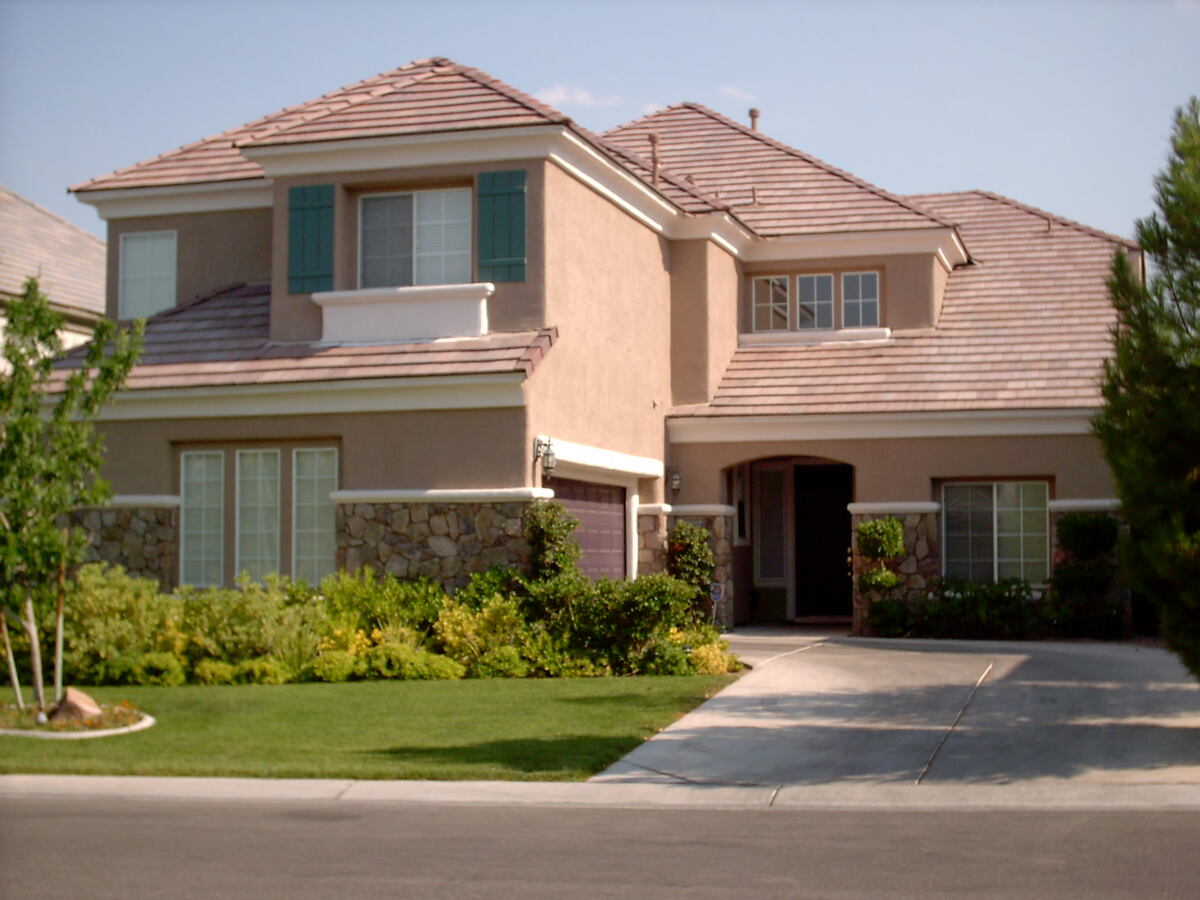
Between the scorching sun and the dry, desert air, it might seem nearly impossible to cultivate the perfect lawn in Sin City. But don’t fret just yet. In this article, we’ll give you some tips on how to grow grass in Las Vegas, and some alternatives in case you decide to ditch the grass altogether.
Is Grass Illegal in Las Vegas?
While grass is not outright illegal, Las Vegas has taken a firm stance against what’s termed “non-functional grass” — grass that serves purely aesthetic purposes without providing any practical use.
New legislation, Assembly Bill 356 (AB356), passed with severe drought conditions in mind, stipulates that starting in 2027, it will be against the law to use water to irrigate non-functional grass on commercial, multi-family, government, and other properties.
Importantly, this law does not extend to grass in single-family residences, meaning homeowners are still permitted to maintain their lawns, both in the front and back of their homes.
Can You Grow Grass in Las Vegas?
Yes, you can grow grass in Las Vegas, but there’s a twist for new homeowners dreaming of planting fresh lawns. Since December 2021, a resolution has been in effect that prohibits the installation of new grass in newly developed residential areas.
This “grass ban” in Las Vegas means that while homeowners can continue to cherish and nurture their existing lawns, those moving into newly built homes won’t have the option to lay down new grass from scratch. Don’t worry though, there are some great water-wise lawn alternatives for Las Vegas that can still make your yard look beautiful.
How to Grow and Care for Grass in Las Vegas
If you own an existing single-family home with a lawn, here’s how to grow grass in Las Vegas:
1. Know Your Soil
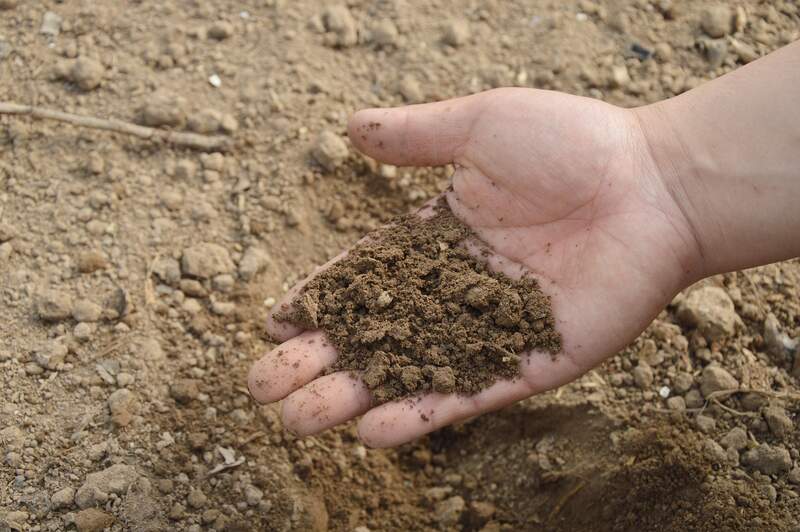
One of the first steps to grow a vibrant lawn in Las Vegas starts beneath the surface, with your soil. If your grass isn’t thriving as expected, it could very well be a sign that your soil conditions are off.
Desert soils, characteristic of the Las Vegas area, typically have low levels of nitrogen and organic matter, both essential for nourishing your lawn. The pH levels can also greatly influence the plants’ growth, and might be too alkaline in the area.
By getting a soil test, you can gain detailed insights into what type of soil you’re working with and what it lacks. Then, you’ll be able to amend your soil effectively.
2. Choose the Best Grass for Las Vegas
Las Vegas is located in the “transition zone.” This means that both warm-season grasses and cool-season grasses are adapted to it. As a result, homeowners in Sin City have a broader palette of grass types to consider for their lawns. However, this choice comes with its considerations, especially given the extreme weather conditions that can prevail in the region.
Warm-Season Grasses
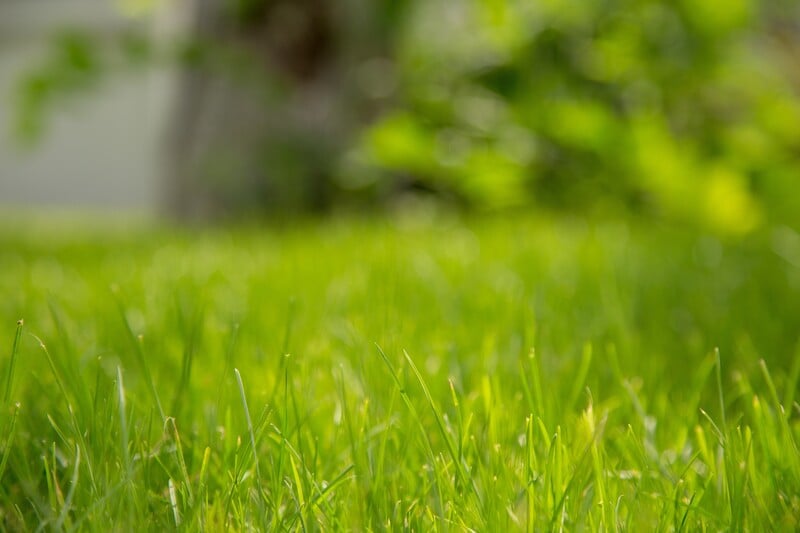
Warm-season grasses are typically more resilient to Las Vegas’ scorching summer temperatures. They thrive in the heat, growing during the long, hot months, and are better at withstanding drought conditions. However, they go dormant during winter, turning a tawny brown color.
The best warm-season grasses for Las Vegas include:
- Bermudagrass: This grass is highly tolerant of drought, and it’s a hardy turf that tolerates heavy wear and tear. However, common Bermudagrass can’t be planted in Clark County (where Las Vegas is located) due to the allergies it can lead to with its pollen production, so opt for hybrid forms.
- Buffalograss: Although not as wear-tolerant as Bermuda, buffalograss is highly drought-tolerant, requiring only 10- 25 inches of water a year. Once established, it also needs very little maintenance.
- Zoysiagrass: This grass is wear and drought resistant, and does well in Las Vegas’ desert soils. However, Zoysiagrass grows slowly and will take longer to recover if damaged.
Cool-Season Grasses
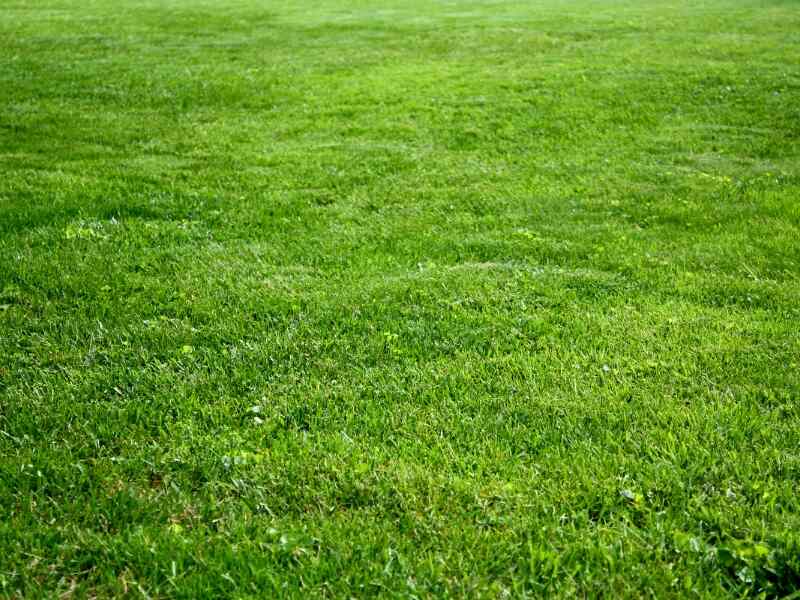
Cool-season grasses offer the advantage of staying green and lively during the cooler months. However, they face significant challenges during the intense heat of the Las Vegas summer, often requiring more water to stay healthy.
The best cool-season grasses for Las Vegas include:
- Tall fescue: This is the most popular grass in the Mojave Desert due to its tolerance of high summer temperatures, but it requires frequent watering. Tall fescue has few insect and disease problems.
- Fine fescue: There are different types of fine fescues available, but all of them are relatively hardy, tolerating drought in different degrees depending on the species. They’re low maintenance and shade tolerant, but don’t usually tolerate high foot traffic.
- Kentucky bluegrass: This grass is high maintenance, and most varieties will suffer in Las Vegas summers. However, Kentucky bluegrass is sometimes mixed with other turgrasses for better performance.
Artificial Grass

Choosing artificial grass for your lawn in Las Vegas makes a lot of sense. It doesn’t need any water, and you won’t have to spend money or time on things like pesticides, fertilizers, or mowing. It’s a straightforward way to keep your yard looking good without the hassle or environmental impact.
There are lots of different types of artificial turfs in the market. If you’d like your lawn to feel soft, there are types made from polyethylene that are soft to the touch. If you need something that can handle a lot of foot traffic, then nylon artificial grass is tough and can stand up to a lot of use.
Just be mindful of the upfront costs of installing artificial grass, which can be higher than natural turfgrasses. It ranges from $5.45 to $20 per square foot.
3. Keep the Lawn Area Small
It’s no secret that maintaining a large area of grass demands a significant amount of water, a precious resource in the desert, and effort. So, why not rethink the size of your lawn? A smaller lawn means less time spent mowing, less money spent on fertilizers and maintenance, and most importantly, less water used for irrigation.
Consider incorporating ornamental grasses and shrubs that are native to the Las Vegas area in the spaces beyond your lawn. They’ll be easier to grow and care for.
4. Know When to Plant Grass in Las Vegas
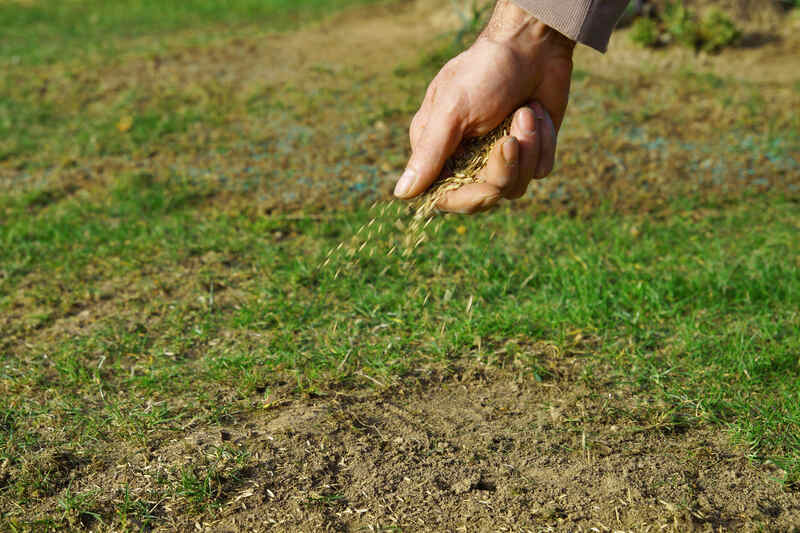
While new laws in Las Vegas restrict planting new lawns from scratch, homeowners are still able to overseed existing lawns or plant grass plugs to repair damaged areas. Knowing the perfect time to plant or overseed can ensure your grass has the best chance to thrive:
- For warm-season grasses, the ideal planting time is during late spring and early summer.
- For cool-season grasses, prefer planting in early fall. Spring is the second best time, but avoid the peak summer months at all costs.
- For homeowners with Bermudagrass lawns that wish to maintain its green color throughout the colder months, overseed with perennial ryegrass in late September to mid-October.
5. Water Efficiently
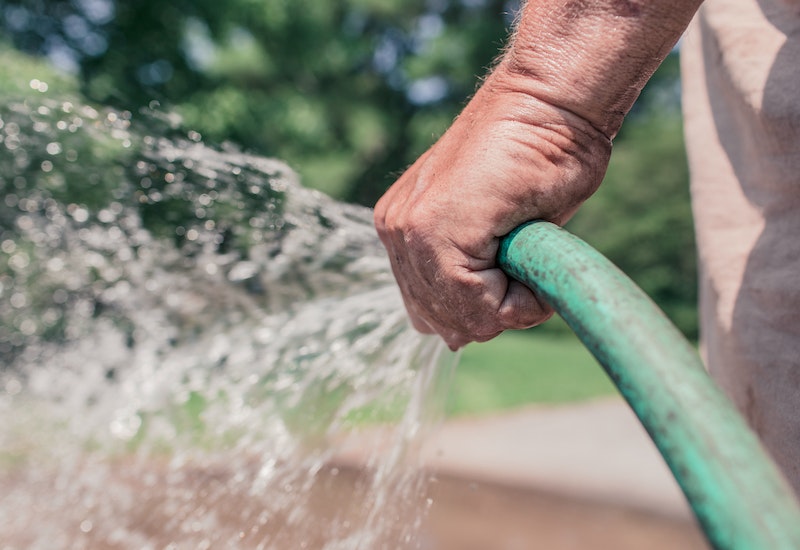
In Las Vegas, water is as precious as gold, so watering your lawn efficiently is a necessity. With the city’s water conservation efforts in full swing, every drop counts. To ensure your lawn benefits from every bit of water without waste, here are some tips:
- Use the cycle and soak method: Instead of watering in one long session, break it down into shorter cycles. For pop-up sprinklers, water for three 4-minute cycles, with one hour between each cycle. For rotating sprinkler heads, aim for three 12-minute cycles.
- Water early in the morning: The best time to water your lawn is between 4 and 8 a.m. Watering in the early morning lets the water seep into the soil to reach the roots before the heat of the day can cause it to evaporate. It also prevents water from lingering too long on the surface, which can lead to diseases.
- Avoid watering on windy or rainy days: Wind can scatter water away from your lawn, while rain naturally provides the moisture your grass needs.
- Adhere to assigned watering days: Las Vegas has designated watering days to help manage the city’s water use. Make sure you know your days and stick to them to avoid fines.
- Give special care for reseeded lawns: If you’ve recently reseeded your lawn, you may need to water it for up to 14 days to ensure germination. However, you have to inform the city before planting so they can make a note on your water account.
6. Mow the Right Way
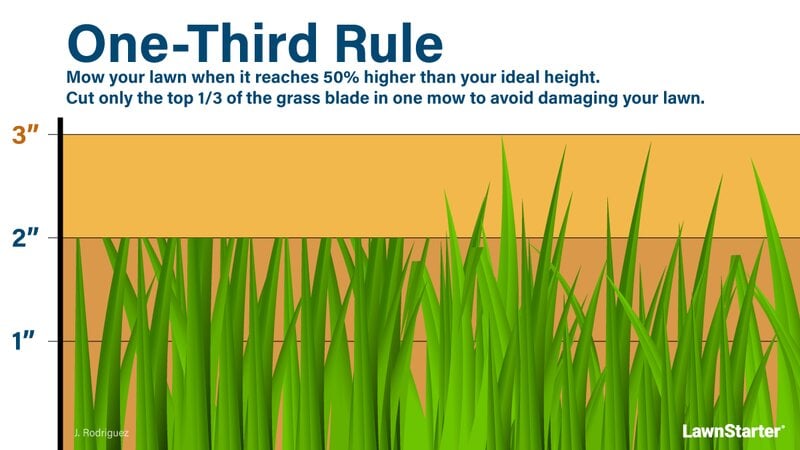
Mowing your lawn correctly goes a long way in maintaining its health and resilience. To ensure you’re mowing your lawn the right way, here are some mowing tips:
- Avoid cutting too short, as this can expose the soil to the intense sun and increase water evaporation, stressing your grass.
- Follow the one-third rule, never removing more than one-third of the grass blade in a single mowing.
- Keep mower blades sharp since dull mower blades can tear the grass, exposing it to disease.
- Set your mower to a higher setting during times of drought. Taller grass shades the soil, reducing moisture loss. It also encourages deeper root growth.
- Leave grass clippings on the lawn after mowing instead of bagging them. Mulching these grass clippings back into the lawn means they’ll decompose and return nitrogen and water back to the soil.
7. Aerate and Dethatch Yearly
Growing a lush lawn in Las Vegas goes beyond just watering and mowing. Two crucial practices that often get overlooked are aerating and dethatching, both of which play a significant role in ensuring your lawn is healthy and that it absorbs every precious drop of water it receives.
Dethatching
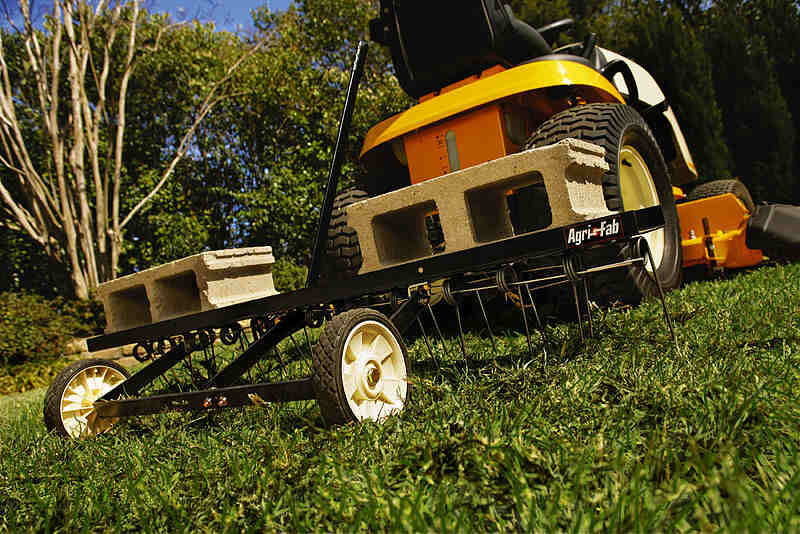
Thatch is a layer of dead grass, roots, and organic matter right above the soil surface. A little bit of thatch (a fine layer) is beneficial, protecting the soil. However, when thatch builds up too thickly, it becomes a barrier, preventing water, nutrients, and air from reaching the soil and the roots of your grass.
To prevent this, it’s essential to dethatch your lawn annually:
- For warm-season grasses, the best time to dethatch is in late spring or early summer.
- For cool-season grasses, dethatch in late summer or early fall.
Aerating
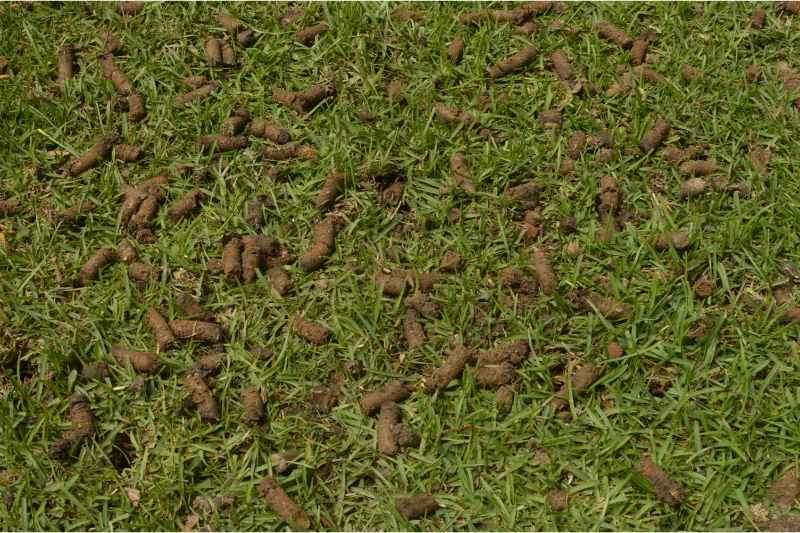
Over time, soil can become compacted, especially in high-traffic areas. Aerating your lawn involves making small holes in the soil to allow air, water, and nutrients to penetrate into the grass roots in compacted soil. This is especially important in Las Vegas, where the dry, hot climate makes efficient water absorption critical.
- Warm-season grasses benefit from aeration in late spring or early summer.
- Cool-season grasses should be aerated during fall.
8. Fertilize the Grass
Fertilizing your lawn in Las Vegas or any other Nevada city requires a careful approach. Overfertilizing risks damaging your grass and can also have adverse effects on the environment, contributing to runoff that can carry chemicals into our water systems.
For warm-season grasses, the optimal time to fertilize is typically from mid-spring through summer. However, the University of Nevada recommends avoiding fertilization during the peak heat of summer, and no more than three times a year, so be mindful of that.
Conversely, cool-season grasses benefit most from fertilization in the fall. This timing helps them recover from the summer heat.
Pro tip: If you have performed a soil test as we recommended in the first step, refer to it to know the nutrients your lawn needs.
Grass Alternatives for Las Vegas
Given the drought conditions and strict watering limitations in Las Vegas, maintaining a traditional grass lawn can be challenging and often impractical. However, there are numerous creative and sustainable alternatives that thrive in the desert climate and add unique beauty to your yard:
- Grow desert-adapted groundcovers like yarrow, ice plant, and Angelina stonecrop.
- Plant native shrubs and trees like desert willow, creosote bush, and Joshua tree.
- Xeriscape with native plants, rocks, and mulch, which don’t need nearly as much water as turfgrasses.
- Plant a cactus or succulent garden.
- Build hardscapes like patios, pergolas, and walkways.
- Grow low-maintenance ornamental grasses like ‘Autumn Glow’ muhly and desert needlegrass.
And if you’re wondering if you can go with these options if you have a small backyard, you absolutely can. For more tips, check our guide on small backyard landscaping ideas for Las Vegas.
FAQ About Growing Grass in Las Vegas
What is the Easiest Grass to Grow in Las Vegas?
For those looking for low-maintenance grass options in Las Vegas, buffalograss stands out among warm-season grasses for its minimal care requirements after being established. If you prefer cool-season grasses, fine fescues are your best bet for ease of maintenance.
How Often Should I Water My Lawn in Las Vegas?
The answer as to when you should water your lawn in Las Vegas is nuanced. Ideally, you should aim to water your lawn two to three times a week, providing roughly 1 inch of water per week. However, you have to align with local watering schedules, which vary by group and season.
For example, during winter, homeowners in the Las Vegas Valley are limited to watering their lawns only once a week.
Does Las Vegas Offer Rebates for Turf?
Believe it or not, yes, saying goodbye to your lawn in Las Vegas could actually fatten your wallet. The Southern Nevada Water Authority runs a rebate program that pays homeowners in single-family homes $5 per square foot of turf they remove. If you own a business or manage a multi-family property, it’s $3 per square foot.
When to Call a Pro
Taking care of a lawn, especially in a challenging desert climate like Las Vegas, is no walk in the park. Between selecting the right type of grass, mastering the art of watering, and navigating local regulations, there’s a lot to keep track of.
Luckily, you don’t have to do it all alone. Call a local lawn care pro near you to provide the expertise and support you need to ensure your lawn thrives in Las Vegas.
Main Image Credit: Gloria Bell / Flickr / CC BY 2.0